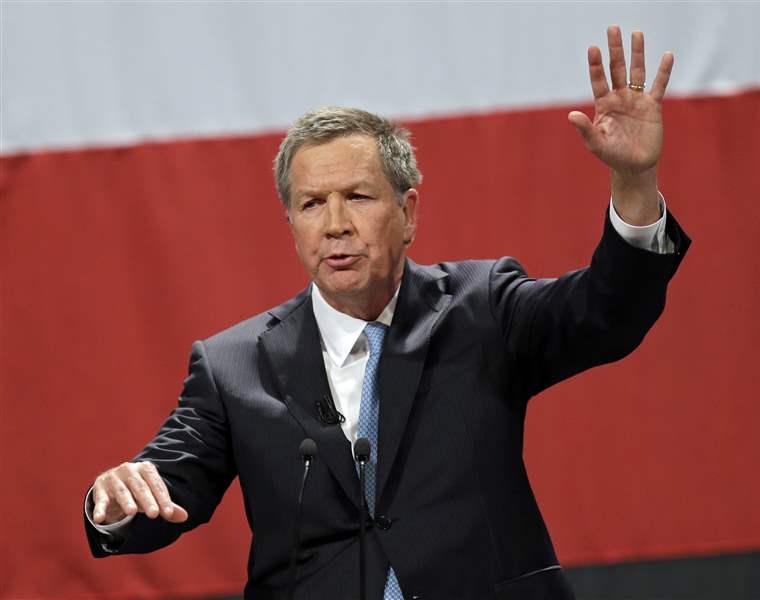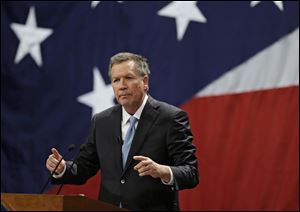
STATE OF THE STATE ADDRESS
Kasich vows to battle for ‘more hopeful’ Ohio
Drug fight, tax cut, more jobs sought
2/24/2014
Ohio Gov. John Kasich delivers his State of the State address at the Performing Arts Center Monday in Medina.
ASSOCIATED PRESS

Ohio Gov. John Kasich delivers his State of the State address at the Performing Arts Center Monday in Medina.
MEDINA, Ohio — Gov. John Kasich called for another income tax cut for Ohioans, a renewed fight against tobacco addiction, and a multifront battle against poverty on Monday as he declared that the State of the State is “stronger,” “more hopeful,” “more optimistic,” and “more confident.”
"If you look, the clouds are beginning to move apart,” he told an audience at the Medina Performing Arts Center as, for the third time, he took his assessment of Ohio’s health on the road.
“The sun is beginning to break through and to shine its great light on that summit,” he said. “If you look, you can see it. We’ve got much further to go, but the success we have gives us the confidence to climb higher. We are not hopeless. We are hopeful. We are not wandering. We have direction, and we need to keep going to advance the state of Ohio.”
RELATED: Text, as prepared, of the entire speech
RELATED ARTICLE: Gov. Kasich honors 3 Cleveland kidnap survivors
The speech was generally shy of large ambitious new proposals but instead focused on incremental extensions of things the governor already has pursued to some extent — another bite at the state income tax to get the highest rate below 5 percent; more options to tackle a growing drug epidemic in the state, particularly heroin, and expansion of vocational training to students as early as the seventh grade.
Remarks by Gov. John Kasich during the State of the State address:
On granting college credit and skilled training certificates to veterans for their skills:
‘If you can drive a truck from Kabul to Kandahar in Afghanistan, don’t you think you ought to be able to drive a truck from Columbus to Cleveland?’
On the plight of the unemployed in Ohio:
‘There’s too many people in our state who don’t have work. ... We’ve got to work everyday, focused on creating this jobs-friendly climate that’s essential to helping our people get back to work.’
On whom he represents:
‘If you voted for me or if you didn’t, I’m your governor. If you’re a CEO or if you’re unemployed, I’m your governor. If you’re living in your own house or you’re living under a bridge, or if you’re an honor student or if you’re an inmate, I’m your governor.’
Given that the speech unofficially represents the launch of Mr. Kasich’s re-election campaign, it was not surprising that protesters on the streets outside the high school and even many of the lawmakers inside took issue with the picture he painted for his auditorium, broadcast, and online audiences.
He received one of his strongest standing ovations when he called for granting college credit and skilled training certificates to veterans for what they learned in war zones.
“If you can drive a truck from Kabul to Kandahar in Afghanistan, don’t you think you ought to be able to drive a truck from Columbus to Cleveland,” Mr. Kasich said.
A recent Quinnipiac Poll found that 51 percent of voters approve of the job he is doing as governor, but more of them than not believe he does not care about their problems. The Republican governor seemed to go out of his way to address those concerns.
“There’s too many people in our state who don’t have work,” he said. “We’re not forgetting you. I’m not forgetting you. We’ve got to work every day, focused on creating this jobs-friendly climate that’s essential to helping our people get back to work. That’s why I can’t fritter away the surplus.”
State Rep. Barbara Sears (R., Monclova Township), the No. 3 House Republican, later said it probably was a good idea to repeat that.
“I think it’s good for him to re-emphasize things, much as he re-emphasized the faith question, because he gets beat up on that,” she said. “The more you say it, the more people actually start to understand it. He has gone out of his way to understand not only the programs that help folks but how you create a meaningful use out of those programs, how you put them into practice.”
Mr. Kasich said it all comes down to “jobs” as he argued that he is governor for all Ohioans.
“If you voted for me or if you didn’t, I’m your governor,” he said. “If you’re a CEO or if you’re unemployed, I’m your governor. If you’re living in your own house or you’re living under a bridge, or if you’re an honor student or if you’re an inmate, I’m your governor.”
This time Mr. Kasich’s call for another income tax cut didn’t come with the call to raise taxes on a burgeoning oil and natural gas drilling industry to help pay for it. Legislative leaders, however, later said they expect tax reform to be part of the way to carry the highest income tax break in the state from 5.33 percent currently to below 5 percent.
The governor again pointed to the roughly 170,000 private-sector jobs created on his watch compared to the roughly 350,000 lost before he took office. Democrats, however, have focused on recent numbers that show the state’s better-than-average recovery slip below the national average.
Ohio’s unemployment rate for December was 7.2 percent, up from 6.7 percent a year earlier.
“Most troubling is the governor’s continued failure to address Ohio’s most pressing challenge,” Democratic gubernatorial candidate Ed FitzGerald said in his video response. “Four hundred thousand Ohioans looking for work and stagnant job growth that has Ohio ranked 45th in the nation in the creation of new jobs: 45th. That is unacceptable, and Ohioans deserve better.”
Protesters outside the high school took particular aim at the proposed additional income tax cut, which they argued will worsen funding for schools, local governments, prisons, and other public services.
“In the maximum-security facilities, it’s getting really bad because you’re cutting more people’s jobs and yet you’re putting more inmates in the prisons,” said James Adkins, a plumber at the Ohio Reformatory for Women in Marysville and correctional assembly president with the Ohio Civil Service Employees Association. “That’s nothing but a recipe for disaster.”
At a prespeech news conference at Martin Luther King, Jr., Academy for Boys in Toledo, Rep. Mike Sheehy (D., Oregon), said, “While the country improves, Ohio is falling behind. For the first time in several years, Ohio’s unemployment rate is higher than the national unemployment rate. ... Today, 31,000 more Ohioans are out of work than the same time last year.”
Rep. Michael Ashford (D., Toledo) boycotted the speech, calling it a show for Republicans in GOP-friendly territory far from the traditional House of Representatives setting in Columbus. He was looking for more from Mr. Kasich for K-12 education beyond broader vocational training and mentoring.
“Give us a plan on how he is going to restore at least $1.8 billion of public education,” he said earlier in Toledo.
Staff writer Ignazio Messina contributed to this report.
Contact Jim Provance at: jprovance@theblade.com or 614-221-0496.